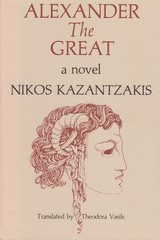
Nikos Kazantzakis is no stranger to the heroes of Greek antiquity. In this historical novel based on the life of Alexander the Great, Kazantzakis has drawn on both the rich tradition of Greek legend and the documented manuscripts from the archives of history to recreate an Alexander in all his many-faceted images—Alexander the god; Alexander the descendant of Heracles performing the twelve labors; Alexander the mystic, the daring visionary destined to carry out a divine mission; Alexander the flesh-and-blood mortal who, on occasion, is not above the common soldier’s brawling and drinking.
The novel, which resists the temptation to portray Alexander in the mantle of purely romantic legend, covers his life from age fifteen to his death at age thirty-two. It opens with Alexander’s first exploit, the taming of the horse, Bucephalas, and is seen in great part through the eyes of his young neighbor who eventually becomes an officer in his army and follows him on his campaign to conquer the world.
The book, which was written primarily as an educational adjunct for young readers, is intended for the adult mind as well, and like the legends of old, is entertaining as well as instructive for readers of all ages. It was originally published in Greece in serial form in 1940, and was republished in a complete volume in 1979.
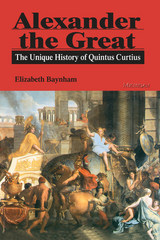
The reign and personality of Alexander the Great---one of the most romantic and powerful kings in history---have remained a source of fascination from antiquity to the present. But because the ancient information surrounding the conqueror is rich, contradictory, and complex, every historian of this near-mythical ruler-whether ancient or modern-invariably creates his or her own Alexander.
The unique work of one such ancient historian, Quintus Curtius, is the subject of Elizabeth Baynham's book. She mines Curtius' study of power for his contemporary perspective, historical methodology, and his portrait of the famous king and presents us with a brilliant, multifaceted study of this unique account regarding one of the most fascinating rulers in history.
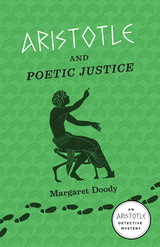
Stephanos and his teacher return in Aristotle and Poetic Justice, when a party given by wealthy Athenian silver miners leads to kidnapping, a ghost, a road trip to Delphi, and, of course, murder. More historical fiction than a detective novel, this sequel runs the gamut of Athenian social customs, myth, politics, and economics—from the trials of virgin love to the dangers of silver lust.
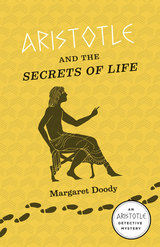
With Aristotle and the Secrets of Life, tensions between the Athenians and the Makedonians—followers of another of Aristotle’s former students, Alexander the Great—draw our heroes across the Aegean Sea. Even as Aristotle and Stephanos escape from pirates, uncover conspiracy, and face the horrors of war, Aristotle finds time to discuss his studies of the natural world in this gripping tale of their quest into darkness.
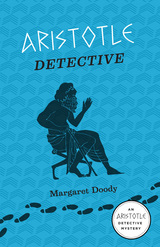
In Aristotle Detective, we first meet Stephanos—naive Watson to Aristotle’s learned Holmes—a young landed Athenian and student of Aristotle. With the aid of his cunning, olive-loving teacher, Stephanos must clear his exiled cousin of murder and save his family’s honor in a tense public trial. Will Stephanos survive to cinch the case?

A condensed Roman history of non-Roman civilizations.
To Justin (Marcus Junian(i)us Justinus), otherwise unknown, is attributed our abbreviated version of the lost Philippic History by (Gnaeus?) Pompeius Trogus, a massive account, in forty-four books, of the non-Roman world and its civilizations, from mythic beginnings through Alexander the Great, the Hellenistic kingdoms, and Parthia. Trogus’ work thus complemented the monumental history of Rome by his Augustan contemporary, Livy, and in high style traced similar moral themes: rulers and states that lack such virtues as moderation, justice, and piety bring harm or ruin on themselves, and often on their realms as well.
Justin, working at some time in the late second to the late fourth century AD, did not produce a strict epitome or summary but what he calls “a brief anthology”: not unlike Florus (LCL 231), who used Livy’s history as the primary source for a brief but original military history of Rome, Justin freely selected what suited his own purposes, favoring “what makes pleasurable reading or serves to provide a moral,” with an eye to the kind of emotive anecdotes that might be useful to orators. He also blends Trogus’ language with borrowings from literature of subsequent generations. Justin’s anthology became one of the most widely read and influential books in the Middle Ages and Renaissance, indeed the main authority on world history other than Roman, surviving in more than 200 manuscripts.
Also included in this edition are the “Prologues,” summaries of Trogus by some other compiler, which preserve many details that Justin omits or reports differently.

A condensed Roman history of non-Roman civilizations.
To Justin (Marcus Junian(i)us Justinus), otherwise unknown, is attributed our abbreviated version of the lost Philippic History by (Gnaeus?) Pompeius Trogus, a massive account, in forty-four books, of the non-Roman world and its civilizations, from mythic beginnings through Alexander the Great, the Hellenistic kingdoms, and Parthia. Trogus’ work thus complemented the monumental history of Rome by his Augustan contemporary, Livy, and in high style traced similar moral themes: rulers and states that lack such virtues as moderation, justice, and piety bring harm or ruin on themselves, and often on their realms as well.
Justin, working at some time in the late second to the late fourth century AD, did not produce a strict epitome or summary but what he calls “a brief anthology”: not unlike Florus (LCL 231), who used Livy’s history as the primary source for a brief but original military history of Rome, Justin freely selected what suited his own purposes, favoring “what makes pleasurable reading or serves to provide a moral,” with an eye to the kind of emotive anecdotes that might be useful to orators. He also blends Trogus’ language with borrowings from literature of subsequent generations. Justin’s anthology became one of the most widely read and influential books in the Middle Ages and Renaissance, indeed the main authority on world history other than Roman, surviving in more than 200 manuscripts.
Also included in this edition are the “Prologues,” summaries of Trogus by some other compiler, which preserve many details that Justin omits or reports differently.
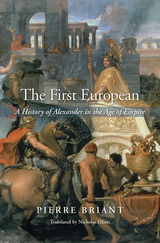
The exploits of Alexander the Great were so remarkable that for centuries after his death the Macedonian ruler seemed a figure more of legend than of history. Thinkers of the European Enlightenment, searching for ancient models to understand contemporary affairs, were the first to critically interpret Alexander’s achievements. As Pierre Briant shows, in the minds of eighteenth-century intellectuals and philosophes, Alexander was the first European: a successful creator of empire who opened the door to new sources of trade and scientific knowledge, and an enlightened leader who brought the fruits of Western civilization to an oppressed and backward “Orient.”
In France, Scotland, England, and Germany, Alexander the Great became an important point of reference in discourses from philosophy and history to political economy and geography. Voltaire, Montesquieu, and Robertson asked what lessons Alexander’s empire-building had to teach modern Europeans. They saw the ancient Macedonian as the embodiment of the rational and benevolent Western ruler, a historical model to be emulated as Western powers accelerated their colonial expansion into Asia, India, and the Middle East.
For a Europe that had to contend with the formidable Ottoman Empire, Alexander provided an important precedent as the conqueror who had brought great tyrants of the “Orient” to heel. As The First European makes clear, in the minds of Europe’s leading thinkers, Alexander was not an aggressive militarist but a civilizing force whose conquests revitalized Asian lands that had lain stagnant for centuries under the lash of despotic rulers.
READERS
Browse our collection.
PUBLISHERS
See BiblioVault's publisher services.
STUDENT SERVICES
Files for college accessibility offices.
UChicago Accessibility Resources
home | accessibility | search | about | contact us
BiblioVault ® 2001 - 2024
The University of Chicago Press









